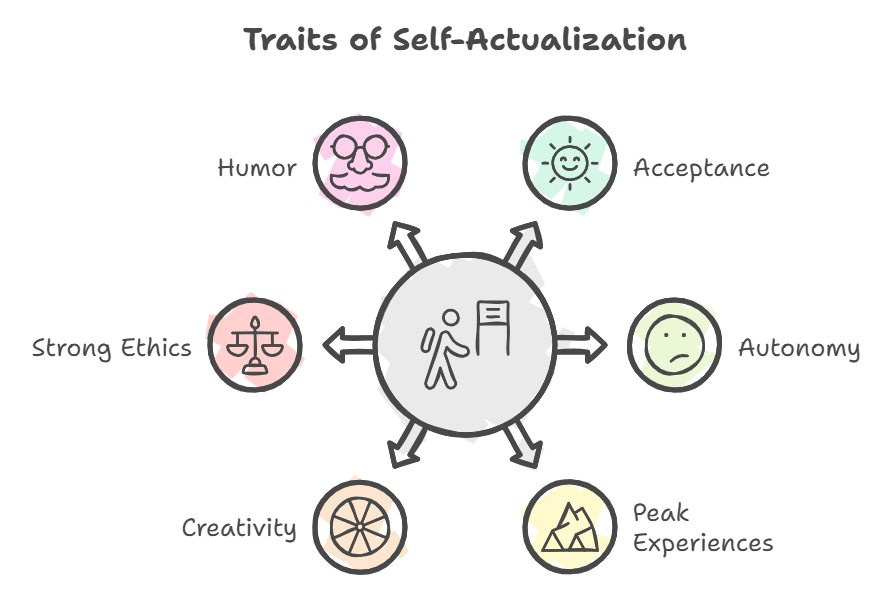Self-actualization has intrigued psychologists, philosophers, and self-help experts for years. It’s about unlocking our potential. But what is it, and how can we achieve it?
Simply put, self-actualization means becoming your best self. It’s about realizing your unique potential and living authentically.
Abraham Maslow popularized this term, but the concept dates back further. Humanistic psychology focuses on motivations and the drive towards self actualization.
Maslow’s hierarchy of needs marks the start of positive psychology. He made key contributions to mental health research. He shared his work via University Press.
Many of us go through life feeling unfulfilled, like we’re not living up to our capabilities. We may have dreams and aspirations, but struggle to pursue them. Self actualization offers a path to greater meaning, purpose, and satisfaction.
It’s about aligning your life with your true nature and values. Human nature is another area to explore when studying self actualization.
Self actualization isn’t just about individual fulfillment. Research suggests it can have profound benefits for society. Self-actualized people, like Lincoln and Einstein, are often more creative, compassionate, and civic-minded.
“What a man can be, he must be. This need we call self-actualization.”
Abraham Maslow
They’re often driven to make positive contributions to the world around them. How do we actually achieve self actualization? What does the journey look like in practice?
What obstacles might we face along the way? Let’s explore the key principles and strategies to unlock your full potential.
Understanding Self Actualization
To grasp the concept of self actualization, it’s helpful to look at its origins. The term “self-actualization” was first used by neurologist Kurt Goldstein in the 1930s.
Kurt Goldstein saw self-actualization as a drive in all organisms. It is to realize their full potential and grow. Abraham Maslow popularized the idea with his hierarchy of needs, or Maslow’s pyramid.
Maslow and Self Actualization
Maslow’s hierarchy has self-actualization at the top. It is the highest human motivation and the final stage of his model. He saw it as the ultimate goal of psychological growth.
It was to fulfill one’s potential. It was essential to human nature.
According to Maslow, self actualization definition includes several facets. Self-actualization means to embrace reality and be spontaneous. It involves focusing on external problems, being autonomous, and having meaningful relationships.
It also means being comfortable with solitude. Maslow published many works on human motivation and self-actualization. They appeared in journals like Psychological Review and the International Journal of Social Psychology.
Maslow believed self-actualization could happen only after basic needs were met. These are: physiological, safety, love, and esteem.
Maslow’s pyramid, or hierarchy, is a debated view. Some argue that self-actualization can occur without fully meeting lower needs. These lower needs are often called, “physiological safety.”
Characteristics of Self-Actualized People
What does a self-actualized person look like in practice? Everyone’s journey is unique. But, research in positive and humanistic psychology found some traits in self-actualized people.
It focused on how they view life. The definition of self-actualization, per the APA, includes:
Acceptance
Self-actualized people tend to have high self-acceptance. They embrace their strengths and weaknesses. This acceptance extends to others as well.
Autonomy
A key marker of self actualization is independence. Self-actualized individuals are less swayed by social pressures. They’re guided by internal values.
Peak Experiences
Maslow found that self-actualized people report transcendent moments of harmony. These “peak experiences” can provide profound insight.
Peak experiences provide insight into human motivation, exploring how humans connect with something larger than themselves1.
Creativity
Self-actualization unleashes creative potential. This doesn’t necessarily mean artistic talent, but an inventive approach to challenges.
One’s abilities can blossom through self-actualization. This is true for both Albert Einstein and Eleanor Roosevelt. Einstein made scientific discoveries.
Roosevelt advocated for human rights. Creativity is a hallmark of this state. It can realize one’s potential, like Aldous Huxley did through literature. It can also showcase ethical views, as Albert Schweitzer did.
Strong Ethics
Self-actualized individuals have a strong sense of ethics and social responsibility. They’re often driven to contribute positively to society2.
Humor
A philosophical sense of humor is another common trait. Self-actualized people can laugh at life’s absurdities.
Self actualization isn’t about perfection. Even self-actualized people have flaws. The key is continual growth and authenticity3.
The Path to Self Actualization
Instead of letting your dreams linger in the abstract, why not get practical about making them a reality? The first step is usually the hardest, but it’s also the most crucial. Step by step, you’ll unlock your hidden potential, and discover a more capable, more confident you – one who’s ready to take on any challenge that comes your way.
Motivation is the spark that sets the fire of self-actualization ablaze – here are the key tactics to fan the flames.

Self-Reflection
The journey begins with honest self-examination. Take time to explore your values and talents. Journaling can be a powerful tool.
Self-reflection is key to unlocking your personal values and how people choose to express themselves in the world. Individuals learn to embrace their own unique style rather than attempting to conform to society’s pressures. Explore self-actualization by taking time to reflect4.
Embrace Growth Mindset
Self-actualization requires a belief that you can grow. Cultivate a growth mindset that sees challenges as opportunities.
Set Meaningful Goals
Identify goals that align with your authentic self. Break them down into actionable steps. The journey is just as important as the destination.
Practice Mindfulness
Mindfulness meditation can increase self-awareness. It helps you live more fully in the present moment. Even a few minutes daily can yield benefits.
Cultivate Relationships
Meaningful connections play a vital role in self-actualization. Surround yourself with supportive people.
Take Risks
Growth often requires stepping out of your comfort zone5. Be willing to take risks and try new experiences. Failure is part of the process.
Contribute to Others
Self-actualization isn’t just about personal fulfillment. Look for ways to use your talents to make a positive impact. The highest potential an individual has includes being fully self-accepting.
Overcoming Obstacles to Self-Actualization
The path to self-actualization isn’t always smooth. There are common obstacles that can hinder our progress:
Fear and Self-Doubt
Fear of failure can hold us back. Recognize these thoughts, but don’t let them define you. Learn how to heal emotional baggage and break free from these limiting beliefs.
Social Conditioning
We’re often influenced by societal expectations. Challenge assumptions about what you “should” do. How people view self-actualization can depend on cultural conditioning.
People living their fullest life may also challenge social norms and redefine social expectations.
For a better understanding of how social conditioning may hinder your path to realizing one’s full potential and realizing one’s true self, delve deeper into this subject through the numerous resources offered by the American Psychological Association, including American Psychological and the broader Psychological Association.
We’re often influenced by societal expectations—shaped by cultural conditioning that dictates what we “should” do. However, self-actualization often involves challenging these assumptions and redefining social norms. For some, this process can be deeply intertwined with overcoming fears of judgment and social pressures.
If social anxiety holds you back from fully expressing yourself, exploring strategies to manage it can be a crucial step. Learn more about social anxiety and how it impacts personal growth.
Or you can explore studies from client-centered therapy that provide a unique look into how societal expectations shape self-image.
This further expands on the idea of self-actualization involves understanding the various aspects of oneself.
Lack of Self-Awareness
It’s hard to actualize your potential if you don’t know yourself. Self-reflection and feedback can increase self-awareness.
Neglecting Basic Needs
While pursuing self-actualization is possible even when lower needs aren’t fully met, chronic neglect can hinder growth.
Self Actualization in Different Life Domains
Self actualization can manifest differently across various aspects of life. One must maintain deep introspection and connection with their own personality traits to determine how self-actualization looks in practice for them.
Consider the examples set by famous self-actualized individuals such as Albert Einstein and others in determining what your path looks like for realizing one’s potential.
Career
In work, self-actualization often means finding a career that aligns with your passions. It’s about feeling a sense of purpose. It also ties in with how you view life as an individual.
Relationships
Self-actualized individuals form deep connections. They’re able to be vulnerable and supportive. How self-actualized people fully accept life, involves seeing their existence as fully embedded within their world of relationships.
Creativity
Self-actualization often involves expressing your creative voice. It’s about creating for the joy of the process. Self-actualized people tend to express themselves through creativity in different forms.
Personal Growth
Self-actualization is a journey of learning and development. This might involve education or remaining curious.
Frequently Asked Questions
What is an example of self actualization?
An example is an artist creating art purely for self-expression, regardless of external recognition.
Another example might be a teacher continually seeking new ways to inspire students. An example could be focusing on meaningful relationships instead of seeking approval.
What are the 4 stages of self actualization?
While there’s no universally agreed-upon set of stages, some theorists propose a progression. This progression includes self-awareness, self-exploration, self-discovery, and self-actualization. Self-actualization is often seen as an ongoing process.
Is self actualisation good?
Self actualization is generally considered positive, leading to personal growth. It often contributes to societal well-being. It’s important to balance it with other needs. This is particularly true in one’s career. It’s viewed as one of the higher human motivation traits.
What does it mean when someone reaches self actualization?
They’re living authentically and realizing their potential. They have a clear sense of purpose and embrace their strengths and weaknesses. They contribute positively to the world. Self actualization is often viewed as a journey.
Conclusion
Self-actualization is a powerful concept that can transform our lives. It’s about becoming the most authentic version of yourself.
The journey isn’t always easy, but the rewards are immense. Personal fulfillment and happiness often stem from self-actualization. It means reaching one’s highest potential.
Self actualization looks different for everyone. There’s no single path. The key is to stay curious, embrace growth, and be true to your values. Self-actualized people fully embrace life and its ups and downs.
Be patient with yourself on your journey. Growth takes time. Setbacks are natural. Celebrate small wins and ask for support when needed.
Self actualization is about living with purpose and making a contribution. By striving to become your best self, you enrich your life. You may also inspire others. It relates closely to humanistic psychology in terms of internal drive.
Small Step, Big Impact
Take 10 minutes today to write down one goal you want to achieve in the next month. Break it down into smaller steps and take one action toward it.
Listen to this article
This is an AI generated Podcast version of the article.
- https://www.researchgate.net/publication/366581837_Spirituality_of_the_developing_person_according_to_Maslow[↩]
- https://boolkah.com/self-actualisation/[↩]
- https://www.linkedin.com/pulse/self-actualization-danijela-jerkovi%C4%87/[↩]
- https://www.betterup.com/blog/self-reflection[↩]
- https://fastercapital.com/topics/the-benefits-of-taking-risks-and-stepping-outside-of-your-comfort-zone.html[↩]



